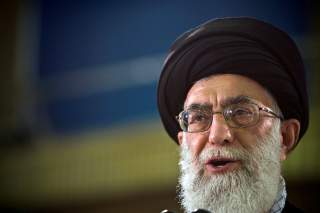The Growing Danger of War With Iran
Brinksmanship in the Persian Gulf. Even without the added recklessness of young princes, the Gulf is the other most likely place, besides Syria, for an incident involving U.S. and Iranian forces to escalate out of control. The U.S. forward presence in what the Iranians regard as their maritime backyard is more than matched by the sometimes reckless and unsafe maneuvers by small craft of Iran’s Islamic Revolutionary Guard Corps. The recent fatal collision of a U.S. Navy destroyer with a merchant ship in Japanese waters shows what can happen in crowded sea lanes even when there is no international conflict or animosity involved. Imagine something similar happening in the Persian Gulf amid the current hostility in U.S.-Iranian relations, with no apparent interest by the Trump administration in restoring a diplomatic channel for defusing incidents.
The nature of the person in the White House. In his Congressional testimony, James Comey mentioned “the nature of the person” as a reason for meticulously documenting his conversations with President Trump, meaning that Trump is a serial liar. The first five months of Trump’s administration is sufficient to see that the lying extends not just to individual falsehoods but to large segments of his policies. On domestic and economic policy, the populism he voiced and that won him decisive votes last year has been revealed to be fraudulent, with health care being only one of the indications of this. There is no reason to suppose that what Trump has said about foreign and security policy, including vote-winning rhetoric about aversion to more foreign wars, is any less fraudulent. With the rhetoric being next to meaningless, other aspects of the nature of the person will be influential, including Trump’s impetuosity, his dwelling on the immediate at the expense of longer-term consequences, and his insatiable appetite for personal approbation at the expanse of broader national interests. None of these qualities augurs well for avoiding conflagration with Iran.
Diversion from difficulty. These personal qualities of Trump make him a prime candidate to turn to the time-honored tactic of using foreign conflict to divert attention from domestic troubles and to win flag-rally popular support. His current support, according to the latest poll on the subject, continues to fall.
Armed conflict with Iran would be an enormously negative event for U.S. interests on several grounds, beginning with whatever expenditure of American blood and treasure was involved. Other consequences would include giving a gift to the most hardline elements in Iranian politics, possibly leading to renunciation of the nuclear agreement and the opening of a path to an Iranian nuclear weapon, as well as collateral damage to U.S. good will and relations with many others, beyond some hardliners in other places who would welcome the spilling of American blood as long as it was done in the service of attacking Iran. One can hope that that there will be enough thinking about such consequences to prevent such an armed conflict from coming to pass.
But war is a possibility, with a likelihood that is somewhere above trivial levels. It is an uncertainty. Also uncertain is the extent to which any conflict that did break out would be fully intended, as distinct from an unintended consequence of aggressive and confrontational policies and postures.
Citizens and members of Congress need to be fully aware of the possibilities and the associated dangers. They should be alert to any new signs that the United States may be headed toward such a war, and they should ask the toughest of questions every step of the way as to whether this path is in U.S. interests.
Image: Iran's Supreme Leader Ayatollah Ali Khamenei speaks live on television after casting his ballot in the Iranian presidential election in Tehran June 12, 2009. REUTERS/Caren Firouz/File Photo.

